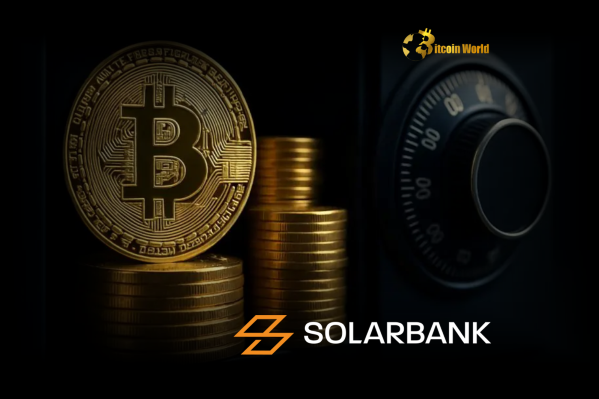BitcoinWorld

Bitcoin: SolarBank’s Strategic Move Adds Crypto to Reserves
In a significant move signaling growing institutional adoption of digital assets, Nasdaq-listed renewable energy company SolarBank has announced plans to incorporate Bitcoin (BTC) into its reserve assets. This decision places SolarBank among a growing list of publicly traded companies exploring cryptocurrency as part of their broader financial strategy.
Why Would SolarBank Add Bitcoin to Reserve Assets?
You might be wondering why a company focused on solar energy would venture into the world of cryptocurrency. SolarBank’s decision reflects a broader trend among corporations seeking alternative strategies for managing their balance sheets in the current economic climate. The primary motivations for companies adding Bitcoin to their reserve assets often include:
- Inflation Hedge: Protecting capital against the potential devaluation of fiat currencies over time. Bitcoin’s fixed supply is seen by many as a store of value similar to digital gold.
- Potential for Appreciation: While volatile, Bitcoin has shown significant long-term growth potential, offering the possibility of increasing the value of corporate reserves.
- Diversification: Adding a non-correlated asset to the corporate treasury portfolio can help reduce overall risk.
- Alignment with Innovation: As a technology-focused company, embracing a leading digital asset like Bitcoin can align with a forward-thinking brand image.
- ESG Narrative (Potential): For a renewable energy company like SolarBank, there’s a potential narrative link to the increasing use of renewable energy in Bitcoin mining, though this aspect requires careful consideration and communication.
Understanding SolarBank’s Plan for Bitcoin Custody
According to reports, SolarBank is actively evaluating how it will hold its planned Bitcoin reserves. The company is considering two primary options for custody:
- Coinbase Prime: Utilizing a reputable third-party institutional custodian like Coinbase Prime. This platform offers tailored services for corporate clients, including secure storage, trading execution, and reporting.
- Self-Custody: Managing the private keys themselves using hardware wallets or other secure methods. This option provides maximum control but also carries significant responsibility and technical requirements to ensure security.
Choosing between these options involves weighing factors like security infrastructure, technical expertise, compliance requirements, and desired level of control. Coinbase Prime offers a managed solution, while self-custody demands internal expertise in digital asset security.
Timing and Amount: What Factors Influence SolarBank’s Bitcoin Purchase?
SolarBank has stated that it has not yet made any Bitcoin purchases. The timing and amount of its initial investment will depend on several key factors:
- Market Conditions: Evaluating the current price and volatility of Bitcoin to identify potentially favorable entry points.
- Capital Requirements: Ensuring that the investment in reserve assets does not compromise the capital needed for core business operations, growth projects, and other strategic initiatives.
- Liquidity Needs: Maintaining sufficient liquidity to meet short-term obligations.
- Regulatory Landscape: Monitoring the evolving regulatory environment surrounding corporate holdings of digital assets.
This approach indicates a cautious and deliberate strategy, aligning the digital asset investment with overall financial health and market outlook, a common practice for companies engaging in corporate treasury management.
SolarBank Joins the Institutional Adoption Wave
SolarBank is not the first publicly traded company to add Bitcoin to its balance sheet, but its decision highlights the expanding nature of institutional adoption across different sectors. Companies like MicroStrategy have made significant, long-term commitments to Bitcoin as a primary treasury reserve asset. Tesla also famously added Bitcoin to its balance sheet and briefly accepted it for payments. Other examples include Square (now Block) and smaller firms across various industries.
This trend suggests a growing acceptance of Bitcoin not just as a speculative asset, but as a legitimate component of a diversified corporate treasury strategy. For SolarBank, a company rooted in traditional infrastructure and energy, this move is particularly noteworthy and could signal a broader shift in how companies perceive and utilize their reserve assets.
Benefits and Challenges of Adding Bitcoin to Corporate Reserves
Adding Bitcoin to reserve assets comes with potential benefits and significant challenges that companies like SolarBank must navigate.
Potential Benefits:
- Potential for Growth: Historically, Bitcoin has outperformed many traditional assets over the long term.
- Inflation Protection: Acts as a hedge against the declining purchasing power of fiat currency.
- Increased Visibility: Can generate investor interest and positive media attention, particularly from those interested in innovation and digital assets.
- Diversification: Offers low correlation with traditional financial markets at times.
Challenges:
- Volatility: Bitcoin’s price can experience rapid and significant swings, potentially impacting the reported value of reserve assets.
- Regulatory Uncertainty: The regulatory landscape for cryptocurrencies is still evolving globally, posing potential risks.
- Accounting Treatment: Current accounting rules (like FASB guidance) often require companies to mark down the value of crypto holdings if the market price drops below the purchase price, even if the price later recovers (though this is changing with new FASB rules effective for fiscal years beginning after Dec 15, 2024, allowing fair value accounting).
- Security Risks: Custody requires robust security measures to protect against theft or loss of private keys.
- Public Perception: Some investors or stakeholders may view cryptocurrency investments as risky or outside the company’s core business.
What Does This Mean for SolarBank and the Market?
For SolarBank, this move could position it as an innovative player in the energy sector, potentially attracting a new type of investor interested in companies with exposure to digital assets. It also signifies confidence in Bitcoin as a long-term store of value.
For the broader market, SolarBank’s decision adds another data point to the growing narrative of institutional adoption. Each new company, especially one from a non-traditional sector like renewable energy, reinforces the idea that Bitcoin is maturing as an asset class being considered for corporate treasury management and reserve assets.
Actionable Insights for Investors and Companies
For investors, SolarBank’s announcement provides a new angle to consider when evaluating the company. It’s important to understand the potential impact of Bitcoin price volatility on SolarBank’s financial statements and overall risk profile. Researching the company’s specific custody plans and risk management strategies is crucial.
For other companies observing this trend, SolarBank’s move serves as an example of exploring alternative reserve assets. Companies considering a similar strategy should conduct thorough due diligence on Bitcoin, understand the associated risks and benefits, evaluate custody solutions, and consider the potential impact on financial reporting and shareholder perception. Consulting with financial and legal experts experienced in digital assets is essential.
Conclusion
SolarBank’s plan to add Bitcoin to its reserve assets is a notable development in the ongoing story of institutional adoption. As a Nasdaq-listed renewable energy company, its decision bridges traditional finance with the digital asset space, driven by motivations like inflation hedging and potential growth. While the timing and amount of the purchase remain subject to market conditions and capital needs, this strategic consideration by SolarBank underscores the increasing acceptance of Bitcoin as a viable component of corporate treasury management. This move is a testament to the evolving landscape of corporate finance in the digital age.
To learn more about the latest Bitcoin trends, explore our article on key developments shaping Bitcoin institutional adoption.
This post Bitcoin: SolarBank’s Strategic Move Adds Crypto to Reserves first appeared on BitcoinWorld and is written by Editorial Team





